Subspecialties
The field of ophthalmology has many exciting subspecialties including cornea, glaucoma, neuro-op, ocular pathology, oculoplastic, ocular oncology, pediatric, and vitro-retinal.
Cataract
Many general ophthalmologists provide a broad general ophthalmological cares ranging from eye infections and contact lens prescriptions to glaucoma and diabetic care. In addition, they specialize in removing the opacified lens and replacing it with an intraocular lens implant. Surgery is performed through a small incision while the patient is usually under local anesthesia. Recovery is rapid and vision is greatly improved.
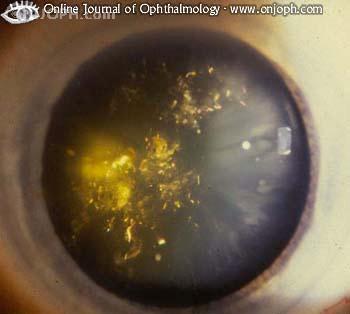
(Photo courtesy of http://www.atlasophthalmology.com)
Glaucoma
Glaucoma is a disease in which retinal ganglion cell death leads to optic neuropathy, decreased vision, and eventually blindness if left untreated. Glaucoma specialists manage this disease both medically, with intraocular pressure-lowering drops, and surgically, with procedures such as peripheral iridotomies and trabeculectomies.
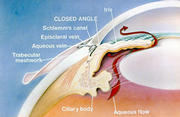
(Photo courtesy of http://www.bouldereyesurgeons.com/closedangle.jpg)
Cornea
Cornea specialists commonly overlap with refractive specialists, both specializing in the anterior segment of the eye, including the cornea. Often they also practice as general ophthalmologists but perform specialized corneal procedures, including refractive and corrective procedures, most commonly LASIK, Penetrating Keratoplasty, and DSAEK.
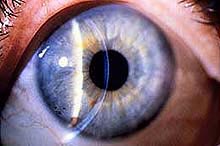
(mage courtesy of spectacle.berkeley.edu)
Neuro-Ophthalmology
Neuro-ophthalmologists specialize in treating neurologic disorders affecting the afferent and efferent visual pathways. They commonly treat problems associated with the optic nerve, cranial nerves, and the brain. Diseases include tumors, infections, inflammatory conditions, and visual disturbances resulting from strokes.

(Photo courtesy of http://www.atlasophthalmology.com)
Oculoplastics
Oculoplastic surgeons specialize in treatment of the eyelid, tear drainage system, and the orbit. These specialists excise tumors, perform reconstructive procedures, clear drainage pathways, and correct eyelid disorders, such as droopy eyelids, or ptosis. Additionally, these surgeons may perform plastic surgeries such as brow and face lifts.
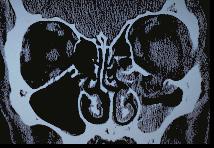
(Photo courtesy of http://www.redatlas.org)
Vitreo-retinal
Vitreo-retinal ophthalmologists specialize in the posterior segment of the eye, most notably the retina. They treat a variety of diseases including macular degeneration, retinal detachment, and diabetic retinopathy. These specialists perform numerous procedures to repair damage to the retina from hemorrhages, holes, tears, and vascularization.
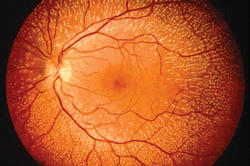
(Photo courtesy of http://research.unc.edu/endeavors/win2005/images/retina.jpg)
